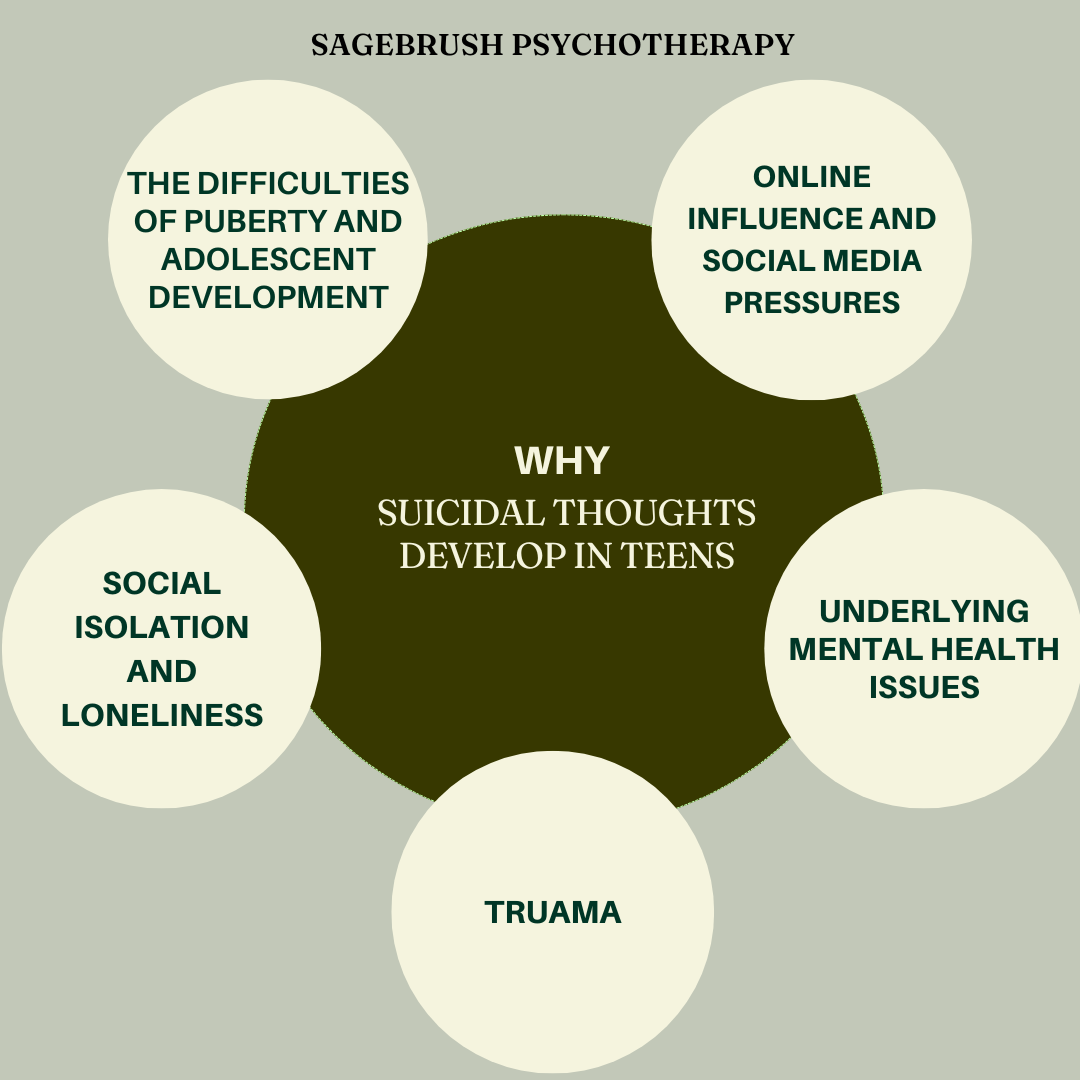Therapy for Teens in Los Angeles: Addressing Adolescent Mental Health Issues
Adolescence is a time of rapid change, self-discovery, and unique challenges. Support for teens requires a thoughtful and skilled therapist who can manage the intricacies of this life stage. At Sagebrush Psychotherapy, we specialize in building genuine connections with our teen clients by seeing the world through their eyes, validating their experiences, and creating a fun and friendly environment. We prioritize flexibility and creativity to meet the unique needs of each client.
Why We Specialize in Therapy for Teens
Adolescents are at a pivotal stage in their development, where they form the foundation for their future relationships, careers, and sense of self. We specialize in teens because we recognize the importance of early intervention and guidance during this critical time. We’ve developed a deep understanding of the challenges teens face today—from navigating social media pressures to managing academic and peer demands.
We engage with teens in a way that feels relatable and respectful, meeting them where they are emotionally and developmentally. Our therapists are skilled at using language and tools that resonate with teens, such as incorporating creative techniques like art to help them express their feelings. We also understand the importance of building trust with teens, creating a space where they feel heard and valued without judgment. Our team stays informed about the latest research and trends impacting teens, ensuring that we provide the most relevant and effective support.
By fostering strong relationships with both teens and their families, we help create an environment of mutual understanding. Whether it’s addressing academic pressures, family dynamics, or mental health challenges, we are dedicated supporting adolescents to build the skills they need to navigate this formative stage of life successfully.
Common Issues Teens Are Facing Today
Social Media and Technology Use
Social media has become a central part of teens' lives, shaping their self-esteem and relationships. Many struggle with the comparison culture fostered by platforms, cyberbullying, and the constant pressure to curate a perfect online image. Teenage girls are particularly vulnerable to body image issues due to social media, where curated images, beauty filters, and unrealistic standards are pervasive. Additionally, balancing screen time with physical health and school responsibilities can be challenging.
Peer Pressure and Relationships
Teens often face intense social pressures, from fitting in with peer groups to navigating the complexities of romantic relationships. Building healthy boundaries, managing conflicts, and strengthening the parent-child relationship are critical aspects of adolescent development. Our therapists offer support teens in developing self-confidence and maintain supportive friendships.
Identity Exploration
Adolescence is a time of self-discovery, and some teens struggle with feeling lonely or misunderstood. We provide a safe space for personal growth, where teens can explore their identity openly, express their thoughts, and build resilience through professional support. Learn more about LGBTQ+ treatment here.
Behavioral Challenges
Many teens struggle with behavioral problems, such as defiance, impulsivity, or difficulty following rules at home or school. These behaviors may stem from underlying mental health disorders, trauma, and peer influence. We help teens build healthy habits, manage emotions, and develop executive functioning skills.
Substance Use and Addictive Behaviors
Experimentation with drugs or alcohol is a common issue among teens, often tied to peer pressure or attempts to cope with distress. Our therapists work to uncover core issues contributing to substance use, offering support for long-term healing and mental healthcare.
Anxiety and Depression
Anxiety disorders and depression are prevalent among teens. See our special treatment topics below. Our therapists provide treatment that helps teens feel less overwhelmed and gain skills to navigate stress and uncertainty.
Self-Harm and Suicidal Thoughts
Self-harm and suicidal behaviors are serious concerns that require immediate intervention. Our therapists provide a safe, supportive space where teens can explore underlying emotions, learn healthier coping mechanisms, and build a sense of hope and stability. Learn more about this treatment here.
Academic Pressure
The demands of school, extracurricular activities, and planning for the future can lead to stress and burnout. We help teens develop time management skills, stress-reduction techniques, and emotional resilience to navigate academic demands without compromising their well-being.
Family Dynamics
Struggles with communication or transitions such as divorce can impact a teen's emotional well-being. Family therapy helps strengthen the parent-child relationship and create a more supportive environment at home.
Special Treatment Topic: Therapy for Suicidal Teens in Los Angeles
Suicidal behaviors in teens are a serious concern that require immediate attention and professional support. At Sagebrush Psychotherapy, we offer therapy for teens in Los Angeles that provides a compassionate and structured approach to help adolescents struggling with suicidal thoughts, self-harm, and other mental health challenges. Our dedicated team of therapists specializes in working with teens, young adults, and their parents to uncover the underlying causes of distress and guide them toward healing.
For immediate assistance view these resources.
Why Suicidal Thoughts Develop in Teens
Suicidal thoughts in teens often arise from a combination of biological, psychological, and social factors. Adolescents go through intense developmental changes that can leave them feeling overwhelmed, confused, and emotionally unstable.
The Difficulties of Puberty and Adolescent Development
Adolescence is a period of rapid physical, emotional, and cognitive growth, which can make teens more vulnerable to distress. Hormonal changes can intensify anxiety, depression, and mood swings, while the pressure to establish identity and independence can create internal and external conflict. As they develop their sense of self, many teens struggle with self-esteem, peer relationships, and their place in the world, making them more susceptible to mental health challenges.
Online Influence and Social Media Pressures
Teens today are constantly exposed to social media, online trends, and digital interactions that shape their perceptions of self-worth. The comparison culture, cyberbullying, and unrealistic portrayals of happiness and success can contribute to negative thought patterns, low self-esteem, and feelings of inadequacy. In some cases, exposure to harmful content can reinforce self-harm behaviors or suicidal ideation.
Social Isolation and Loneliness
Feelings of social disconnection can be a major factor in the development of suicidal thoughts. Whether due to bullying, academic pressure, family struggles, or personal insecurities, many teens withdraw from friends and family, leading to increased emotional distress. The lack of a supportive environment can make it difficult for them to seek help or express their emotions in healthy ways.
Trauma
Another cause is trauma, such as sexual assault, abuse, or bullying. Trauma can lead to problematic thinking patterns, difficulty trusting others, and a deep sense of emotional pain. If left unaddressed, these wounds can contribute to self-harm, suicidal thoughts, and destructive behaviors.
Underlying Mental Health Issues
Many suicidal teens also experience mental health conditions such as anxiety disorders, depression, eating disorders, and other co-occurring issues. Without proper mental health treatment, these conditions can worsen, making it difficult for teens to see a path forward.
Our Treatment Approach: Dialectical Behavior Therapy for Suicidal Teens
At Sagebrush Psychotherapy, we believe that Dialectical Behavior Therapy (DBT) is one of the most effective approaches for teens struggling with suicidal behaviors, self-harm, and intense emotional distress. DBT is a gold-standard, evidence-based treatment that empowers teens to take control of their emotions, change harmful thought patterns, and build a life worth living—even in the face of overwhelming challenges.
Many teens who experience suicidal thoughts feel trapped in a cycle of emotional pain, impulsive reactions, and isolation. DBT provides them with a roadmap for long-term healing by teaching practical skills they can use every day to manage their distress. This therapy is more than just talking—it’s about giving teens real tools that work when they feel overwhelmed.
Some teens need a higher level of support, and we collaborate with residential treatment centers in Los Angeles County for those requiring intensive care.
Special Treatment Topic: Teen Anxiety Therapy in Los Angeles
Many teens struggle with constant worry, social anxiety, panic attacks, or obsessive thoughts. These issues often affect school, friendships, and self-confidence. Social media, academic pressure, family conflicts, trauma, and isolation can also trigger or worsen anxiety disorders.
We help teens:
Recognize and challenge negative thought patterns.
Develop coping skills for managing stress and fear.
Use mindfulness exercises to stay grounded.
Strengthen self-confidence and improve social interactions.
Special Treatment Topic: Therapy for Teen Depression in Los Angeles
To understand the signs of depression in teens visit our depression treatment page here. Teen depression is more than just sadness—it can affect motivation, relationships, school performance, and daily life. Many teens struggle with persistent sadness, irritability, fatigue, loss of interest, or feelings of worthlessness.
We help teens:
Restructure negative thought patterns to reduce self-criticism.
Reignite interest in hobbies and passions to rebuild purpose.
Use creative therapies like art, music, and writing for emotional expression.
Improve daily structure and routines to reduce feelings of stagnation.
Strengthen family relationships through family therapy to enhance support.
Special Treatment Topic: Teen Treatment for Personality Disorders in Los Angeles
Personality disorders are typically not officially diagnosed before the age of 18, as personality is still developing during adolescence. For teens under 18, mental health professionals often focus on treating symptoms rather than labeling a disorder.
Early intervention can help prevent long-term struggles and improve emotional stability. If a teen is showing signs of persistent mood swings, self-harm, identity struggles, or difficulties in relationships, therapy can help build coping skills, distress tolerance, and self-awareness—regardless of whether they meet full diagnostic criteria.
Special Treatment Topic: Therapy for LGBTQ+ Teens in Los Angeles, CA
Adolescence is a period of self-discovery, and for LGBTQ+ teens, this journey can present distinct challenges. Questions surrounding identity, fears of rejection, and navigating relationships can feel overwhelming, particularly in a world that may not always offer the necessary support. Living in a predominantly heteronormative and cisnormative society can make these challenges even more pronounced, leading to feelings of isolation, anxiety, and self-doubt.
Supporting LGBTQ+ Teens
Understanding one’s sexual orientation or gender identity is a deeply personal and sometimes confusing process. Our work focuses on:
Exploring identity with curiosity, self-compassion, and positive reinforcement.
Building emotional resilience and developing coping strategies for stress, dysphoria, or social rejection.
Gaining confidence in advocating for themselves and making their own decisions.
Connecting with affirming resources in Los Angeles, CA, including LGBTQ+ community support and safe social networks.
Through adolescent therapy, we create a space where teens can process their emotions, develop healthy relationships, and work toward long-term healing.
Helping Parents and Other Family Members Through the Journey
When a teen begins questioning their identity or comes out, it can be an emotional process for parents and other family members as well. Even the most supportive families may feel uncertain, grieve their expectations, or feel overwhelmed by societal pressures and misinformation. Family therapy provides a space where parents can process their emotions, strengthen their bond with their teen, and receive additional guidance on how to be a supportive ally. We help families:
Understand their teen’s experience in a non-judgmental setting.
Process their own emotions, including fear, confusion, or grief.
Communicate supportively, even when they are still learning.
Navigate family dynamics, school-related concerns, and community pressures.
Access LGBTQ+ affirming resources and education to better support their child’s well-being.
While Los Angeles has a vibrant LGBTQ+ community, not every teen feels supported in their home, school, or social circles. Through individual therapy, group therapy, and family therapy, we work to strengthen family relationships and create a home environment where teens feel safe, loved, and valued.
Frequently Asked Questions
-
Yes you will be involved in your teen's therapy process, but their confidentiality will also be respected. Parent involvement may include attending sessions focused on family dynamics, learning strategies to support your teen at home, and maintaining open communication with the therapist about general progress. However, teens need a safe and private space to express themselves, so specific details shared in therapy are kept confidential unless there is a safety concern, such as risk of harm to themselves or others. This balance helps build trust between the teen and their therapist while keeping parents informed and engaged.
-
It’s common for teens to feel hesitant or resistant to therapy, especially if they’re unsure what to expect or feel it’s being forced upon them. Here are some strategies to encourage their participation:
Open a Dialogue: Talk to your teen calmly and openly about their concerns. Ask why they’re hesitant and listen without judgment.
Emphasize Benefits: Frame therapy as a safe and supportive space where they can express themselves, not a punishment or something “wrong” with them.
Offer Choice: Involve them in the decision-making process by letting them help choose the therapist or decide between in-person and virtual sessions.
Start Small: Suggest trying a few sessions as a trial, with the option to stop if they don’t find it helpful. Sometimes, just getting started can reduce their resistance.
Normalize Therapy: Share that therapy is common and helpful for many people, including teens, to manage life’s challenges.
Enlist a Trusted Adult: Sometimes teens may be more open to encouragement from someone they trust, like a coach, teacher, or family friend.
If resistance continues, a consultation with the therapist can help you strategize ways to engage your teen or explore alternative options to support them.
-
We offer after school sessions to accommodate your child’s schedule. We have both after school and weekend availability.
Get Started with a Therapist for Teens in Los Angeles
At Sagebrush Psychotherapy, we recognize the unique challenges teens face and honor the diversity of their experiences. Whether your teen is struggling with mental illness, anxiety, or behavioral issues, we provide a supportive environment for healing. Our dedicated team offers individual therapy, group therapy, and family therapy.
We proudly serve the Los Angeles community, offering both in-person and virtual therapy sessions to support teens in their healing journey. Let’s work together to help your teen build confidence, develop coping skills, and thrive in daily life.








